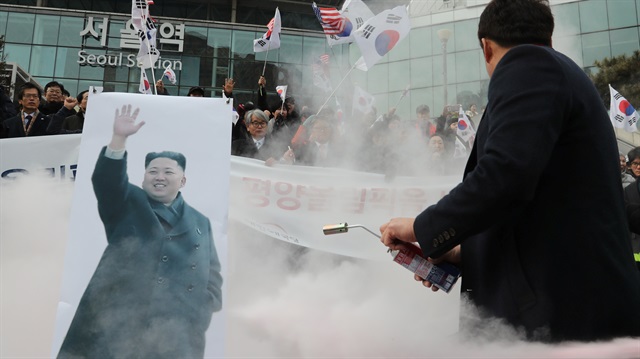
Around 200 protesters make their opposition clear to visiting North Korean delegation headed by star band leader
Conservative South Korean politicians and activists on Monday set alight a North Korean flag and image of the reclusive state's leader Kim Jong-un, in a move timed with the visit of a high-profile Winter Olympics delegation from the North.
A crowd of protesters gathered at Seoul Station to meet the delegation, which included glamorous North Korean music star Hyon Song-wol, who has attracted keen attention in the South during her two-day trip touring venues ahead of planned performances by her band.
Hyon's visit is part of a series of agreements produced by breakthrough inter-Korean talks this month. The two sides will also field a joint women's ice hockey team at the Games, which will begin on Feb. 9.
Public sentiment has shown sympathy for South Korean hockey players who could lose ice time at the Olympics, while many conservatives have raised concerns that the South is being overly gracious at a time when the world is squeezing North Korea's nuclear weapon ambitions through sanctions.
After Hyon and her fellow delegates made their onward journey from Seoul Station, police officers stepped in to extinguish the flames rising around the banner featuring Kim Jong-un, whose image is revered in the North.
"The PyeongChang Winter Olympics is turning into 'Kim Jong-un's Pyongyang Olympics' that effectively recognizes its nuclear armaments and propagates the North Korean regime," the protesters complained, according to local news agency Yonhap.
The activists also burned the so-called unification flag -- a light blue silhouette of the Korean Peninsula on a white background -- which Seoul and Pyongyang have agreed to march behind together at the PyeongChang 2018 opening ceremony.
Thousands of demonstrators showed a similar anti-North sentiment on the streets of Seoul last November when they came out to cheer visiting U.S. President Donald Trump.
However, South Korea's liberal President Moon Jae-in has stressed a dual approach, insisting on North Korea's denuclearization while pursuing dialogue to ease tensions.




